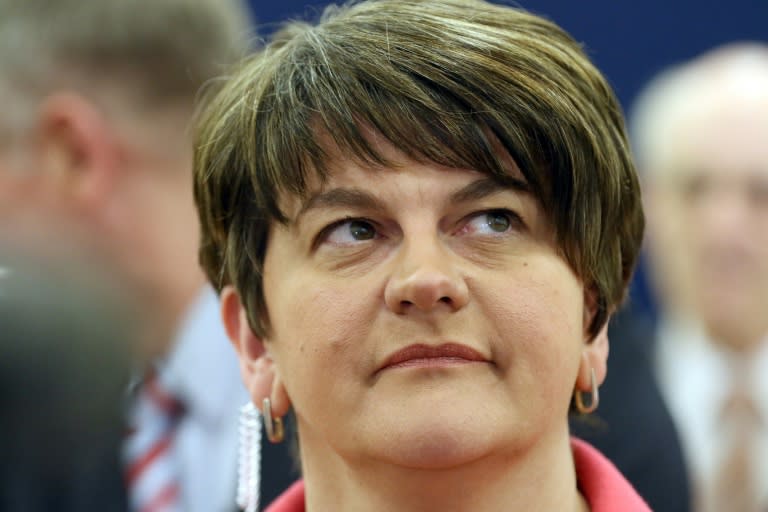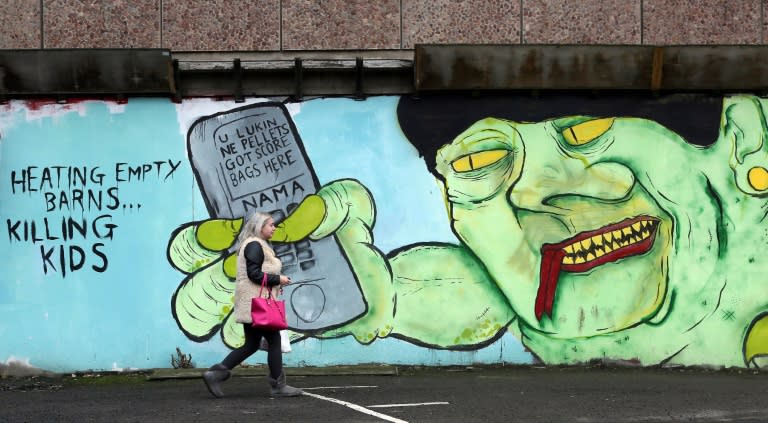Arlene Foster: War-hardened leader with key to British power
Arlene Foster, the woman who struck a deal to prop up British Prime Minister Theresa May on Monday, is a tough leader who experienced the bloodiness of the Northern Ireland conflict firsthand at an early age. When she was just eight years old, her policeman father was shot in the head by Irish Republican Army (IRA) paramilitaries at their farmhouse near the border with the Republic of Ireland, which was then highly militarised. At 16, Foster's school bus was blown up in another attack by the IRA aimed at killing its driver -- a part-time member of the security forces. Now aged 46, Foster holds the balance of power in British politics despite being dismissed as a has-been just a few months ago because of an ongoing scandal over a government scheme for renewable energy. Foster, leader of the Democratic Unionist Party, and Conservative chief May looked on as their two parties signed an agreement in Downing Street on Monday that will offer the vital support of the DUP's 10 MPs. That will give May just enough votes to be able to govern by a razor-thin margin after she lost her majority in a disastrous general election showing on June 8. The deal gives the DUP unprecedented influence, including on the international stage as Britain negotiates the terms of its exit from the European Union. While her party supported Brexit in last year's referendum, it also wants an open border with Ireland and is aware of growing concern in Northern Ireland about the consequences of a "hard Brexit". - 'Part of who I am' - Dismissing widespread concerns since the election over her ultra-conservative party's opposition to gay marriage and abortion, as well as its scepticism over climate change, Foster has said the DUP will confound its critics. This may be uncharted territory for Foster and her party, but the former solicitor and veteran Northern Ireland assembly member is well versed in tough negotiations, and is no stranger to adversity. In a 2015 interview with The Belfast Telegraph, she acknowledged that the attacks she witnessed in her childhood had shaped her outlook on life. "It is part of who I am and can't be denied. It informed my teenage years, it informed my political decisions, but at the same time I don't think we should let the past define what we do in the future," she said. Her father, John Kelly, survived the 1979 attack but it forced the family to move from the small farm where they lived to the relative security of the nearby town of Lisnaskea. After secondary school in Enniskillen, Foster graduated from Queen's University in Belfast with a law degree. During university she joined the Young Unionist Association, the youth wing of the Ulster Unionist Party (UUP), which had ruled Northern Ireland virtually unchallenged since the state was created in 1922. While practising as a lawyer she met her husband Brian. They have three children. - Polarising politics - Foster was elected to the newly formed local assembly in 2003 but like many UUP members she defected the following year to the rival upstart DUP in protest over the terms of the Good Friday Agreement negotiated by UUP leader David Trimble. At the time Foster, an Anglican, acknowledged the perceived difficulties of joining a male-dominated party with its roots in the fundamentalist Free Presbyterian Church of Ulster, both of which were founded by the evangelical minister Ian Paisley. But she described it as meritocratic and welcoming, and quickly rose through its ranks. The 1998 Good Friday accord ended three decades of political violence that cost 3,500 lives and paved the way for a devolved assembly but it also infuriated many, including Paisley's DUP, who opposed any amnesty for IRA prisoners as well as police reforms. But after the IRA arms decommissioning, Paisley in 2007 formed a power-sharing executive with Sinn Fein, with former IRA commander Martin McGuinness as his deputy. As first minister, Foster had a fraught relationship with McGuinness before he resigned in January and died a few weeks later after a short illness. Her attendance at McGuinness's funeral in the heart of the Irish nationalist city of Derry was greeted with applause from the congregation, and many hoped it would signal the beginning of a new chapter. But those hopes quickly dissipated after local and national elections in which both the DUP and Sinn Fein increased their vote, showing that almost two decades after the peace agreement was signed Northern Ireland remained as polarised as ever.

 Yahoo Finance
Yahoo Finance 


